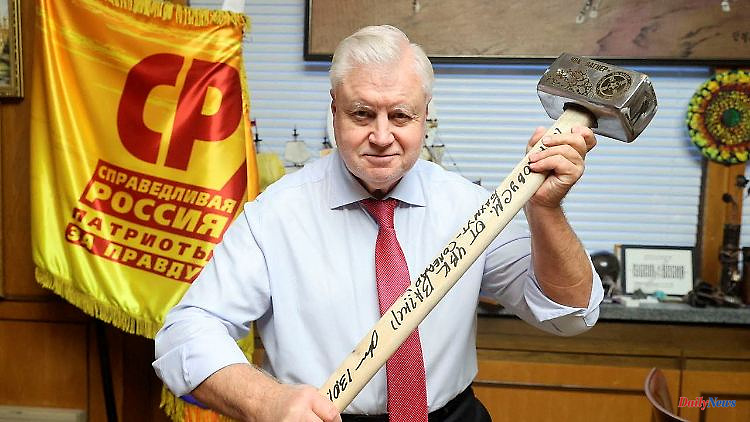Since the murder of a Wagner deserter, the sledgehammer has established itself among radical war supporters as an instrument for intimidating those who think differently. Even in the highest political circles, the tool of torture is suddenly acceptable - with possible consequences for the entire Russian civil society.
Shortly after the explosion on the Crimean bridge, 19-year-old student Olesya Krivtsova criticized the Russian attack on Ukraine in an Instagram story. Fellow students from her university in the port city of Archangelsk take a screenshot and report Olesya to the authorities. Three months later, the student is on a terror list - along with extremists from al-Qaeda and the Islamic State. State television broadcasts a talk show in which a local politician calls her an idiot who should be visiting the graves of fallen soldiers in Donbass. At the end of December Olesya is arrested in her apartment. She later told her mother that one of the officers had a sledgehammer with him. "Greetings from Wagner," he said.
Olesya Krivtsova is what you call an example. Her case illustrates how strongly any critical tone within Russian civil society is now suppressed - and with the methods of a mafia state. The sledgehammer is a threat that everyone in Russia understands. A Telegram video made sure of that, showing the execution of a deserted mercenary from the Wagner group with just this sledgehammer. The pictures can hardly be surpassed in terms of cruelty, which is one of the reasons why they are now used not only by Wagner boss Yevgeny Prigozhin as an instrument for disciplining his own fighters. Political hardliners, war supporters and law enforcement officials have also discovered the sledgehammer as a symbol for themselves. In radical circles it has replaced the "Z".
At the beginning of the war, the "Z" was seen as a low-threshold way of showing one's support for the war in Ukraine, but now it's no longer enough for some to express their belligerence. Sergei Mironov, leader of the Fair Russia party and its faction leader in the Duma, posed last week with a sledgehammer engraved with the Wagner logo and published the picture on Telegram. He wrote that this was a "useful tool to thwart the Nazi ideology that wants to destroy our country". Mironow called for the activities of the Wagner Group to be legalized within the country as well. Officially, private military organizations, so-called PMCs, are banned in Russia.
What the legalization of a private army known for its brutality could lead to became apparent at the end of December in front of the Finnish embassy in Moscow: almost a dozen masked men threw several sledgehammers over the fence in front of the embassy building - a clear signal to the northern neighbor, who had been dead since the attack pushed for Ukraine to join NATO and closed its border with Russia. It is unclear whether the masked persons acted of their own accord or were commissioned. But such attempts at intimidation have a clear impetus: Prigozhin.
The Wagner boss himself had previously had a video circulated in Russian propaganda channels, which is said to show a sledgehammer smeared with fake blood being handed over to the EU Parliament. This was never confirmed, but it still had an impact on some war advocates in Russia. Their actions prove that the mercenaries' cruel methods, only speculated about in previous conflicts, are being legitimized in certain circles. For Wagner, the sledgehammer has not only been a tool of punishment for traitors and deserters since the Ukraine invasion. There were already executions of this kind during the Syrian war.
Wagner mercenaries have been deployed in many conflict zones for years - including in the war waged by the Russian-backed Syrian ruler Bashar al-Assad against his own people. Video footage of Russian mercenaries torturing Syrian prisoner Hamdi Bouta with a sledgehammer caused international outrage back in 2017. Bouta did not survive the ordeal. Prigozhin himself once described the sledgehammer as a "symbol of revenge," but he never took responsibility for the actions of his fighters. It was only last fall that he even admitted to having founded Wagner. Since then he has been trying to raise the public profile of his combat troops.
In an open letter he sent to Russian media and military bloggers last week, Prigozhin complained about the discrediting of his fighters as "villains and criminals" and called for criticism of Wagner - just as is already the case for Russia's conventional army - should be punished. To do this, only the relevant paragraph 280.5 in the law would have to be expanded. There are advocates of such a move. It is not only Duma politician Mironov who sees no contradiction in Wagner's barbaric methods and the Russian penal code. Regarding Mironov's pose with the sledgehammer, the regime critic and Russian exile Mikhail Khodorkovsky wrote that this is what the "total degradation of Russian politics" looks like.












